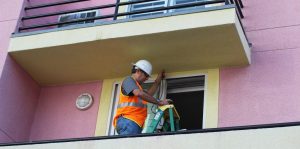 *New Legislation
*New Legislation
In 2015, a wooden balcony collapsed at the Library Gardens apartment complex located in the City of Berkeley, near the University of California, Berkeley campus. The balcony collapse killed six young adults and injured seven others, and investigations later revealed the balcony had decayed wooden joists caused by wood dry rot left untreated because of poor building maintenance.
In response, the California Legislature passed Senate Bill 326 (“SB 326”) which took effect January 1, 2020. SB 326 added new Civil Code section 5551 to require HOAs having three (3) or more multifamily dwelling units to conduct mandatory inspections for “exterior elevated elements,” such as decks, balconies, stairways and walkways, that are supported by wood or wood-based products. The inspections are intended to determine whether the exterior elevated elements and their associated waterproofing components are in a generally safe condition and performing in accordance with applicable standards. The inspections are required every nine (9) years, with the deadline for the first inspection rapidly approaching: January 1, 2025.
In its initial form, Section 5551 allowed only licensed structural engineers or architects to perform these inspections. Assembly Bill 2114 (“AB 2114“) was proposed to add licensed civil engineers to that list of permitted inspectors. According to the AB 2114’s author, “licensed civil engineers are allowed to practice structural engineering by virtue of that license as long as structural engineering is within the licensee’s area of expertise. Because the deadline for completing the first round of inspections of these elements is January 1, 2025, [AB 2114] has an urgency clause so that HOAs who still have yet to complete their inspections may take advantage of the expanded inspector list before the compliance deadline.”
AB 2114 was passed by the Legislature and approved by the Governor on July 15, 2024. It takes effect immediately as an urgency statute.
| Condominium HOAs that have still not performed these inspections should take immediate action to get the ball rolling and ensure they comply with the January 1, 2025 deadline. We have already observed significant price increases for these inspections as the deadline draws closer, due to increasing demand. The same is true for construction costs in situations where the inspection reveals the need to perform immediate repairs due to safety concerns. |
 HOA Lawyer Blog
HOA Lawyer Blog

